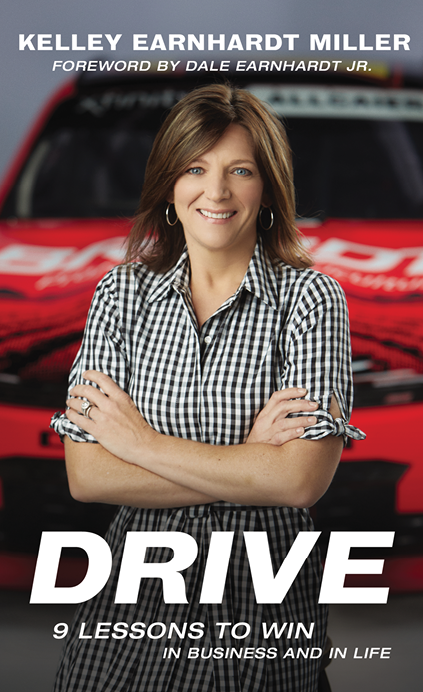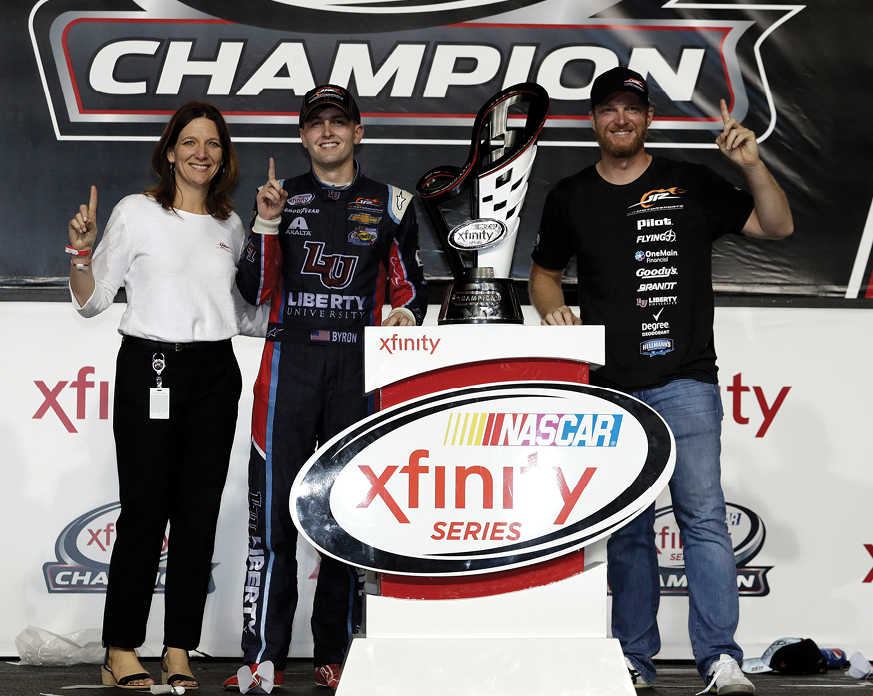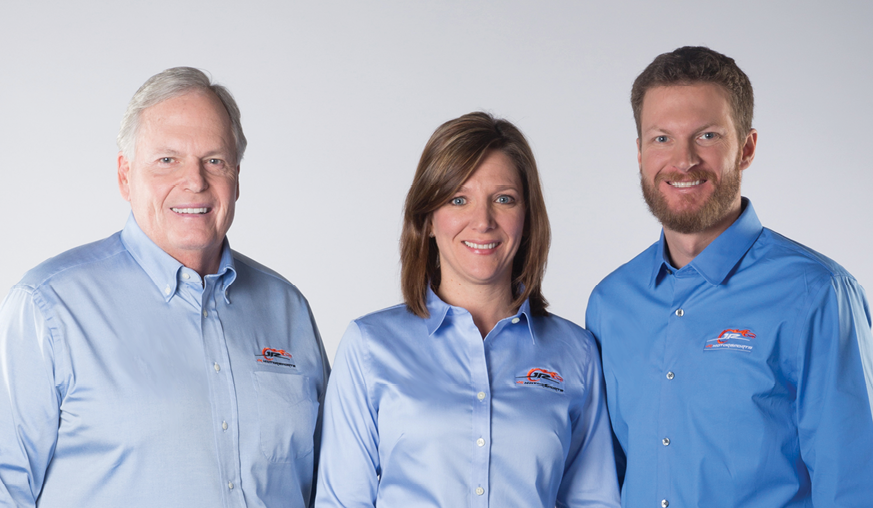- Home
- Media Kit
- Current Issue
- Past Issues
- Ad Specs-Submission
- Ad Print Settings
- Reprints (PDF)
- Photo Specifications (PDF)
- Contact Us

![]()
ONLINE

A Racing Family
Editors’ Note
Kelley Earnhardt Miller is part owner and general manager of JR Motorsports and is considered one of the most prominent businesswomen in NASCAR. She oversees the company’s race team, management team and business ventures for her brother, Dale Earnhardt Jr. A multiple-award recipient, she was named in 2015 as one of SportsBusiness Journal’s Game Changers/Women in Sports Business for her impact on the motorsports industry. The daughter of seven-time NASCAR champion Dale Earnhardt, she graduated from the University of North Carolina at Charlotte with a B.A. in business administration.
Company Brief
Now in its 19th year, JR Motorsports (jrmracing.com) is the professional race team and management company co-owned by Dale Earnhardt Jr., NASCAR’s 15-time Most Popular Driver and winner of 50 NASCAR-sanctioned races. The company is based in Mooresville, North Carolina, and operates out of a 66,000-square-foot facility that serves as the nucleus of the company’s racing, marketing and business interests. JR Motorsports tours nationally in the NASCAR Xfinity Series with four full-time entries. JR Motorsports is also active regionally with its late model program, upon which the company was founded. JRM expanded into the NASCAR Camping World Truck Series with a single entry in 2015-16, scoring two wins, including a victory in only its second series start.

Did you always know that you had a passion to join the family business?
I figured I would do something in racing, but I was focused on going to college because my dad was focused on me going to college. I was the first kid in my family to go to college. My father only finished the eighth grade and he was very disappointed in that and wished that he had went further.
I started working in the sport while I was in college and worked for a marketing firm since my dad didn’t want us working directly in his business. Most of my early career was spent at Sports Image and Action Performance.
Will you discuss JR Motorsports and how you focus your efforts?
I oversee about seven or eight different entities. One of these is our race teams, JR Motorsports, which is the top dog of what I do. We race in the NASCAR Xfinity series and have four race teams. I focus on the relationship piece of it with the sponsors.
I am involved in negotiating contracts and understanding what our sponsors’ marketing plans are, why they want to be in the sport and how they want to use our assets to meet the goals they’ve established within their own organizations.
My other primary role is serving as Dale’s agent and brand manager. We also have ownership in a bar and restaurant concept at several locations in airports across the United States.

William Byron wins the Xfinity Series Championship on
November 18, 2017 during the Ford EcoBoost 300 at
Homestead Miami Speedway in Homestead, Florida
Was it difficult being a woman in a sport which is known for being male-oriented?
Our sport has changed as the world has changed, and there is more acceptance of women in different areas. I had a leg up when I came into the business. I was an Earnhardt.
I feel like it would have been much more difficult if I had come into the sport as a female without the Earnhardt name. My dad had a very good reputation as a common-sense businessperson and a no-BS kind of a guy. It helped that he had so much respect and was such a leader in the sport.
I have seen opportunities grow for women in the sport, but they are still mainly in PR, marketing and other similar areas. When you get into the competition side of it, such as being on the pit crews, tire specialists or working within the shops, it is still very challenging for women in our sport.

JR Motorsports’ co-owners Rick Hendrick,
Kelley Earnhardt Miller and Dale Earnhardt Jr.
What interested you in writing your book, Drive: Nine lessons to Win in Business and in Life?
When we were working on Dale Jr.’s book, I was having a conversation with one of the ladies at W Publishing and told her a little bit about me. I mentioned that I wanted to write about my growing up as Dale Earnhardt’s daughter since I felt that race fans would be attracted to that and would want to know more about that experience.
Our fan base is very loyal and wants to know every possible thing that they can. We are very accessible in our sport which is different than a lot of other professional sports. I was telling her that everybody thinks it must have been a bed of roses when you grow up underneath someone that has such a fabulous reputation as a race-car driver.
I wanted to talk about this because it wasn’t always easy being his kid when I was growing up. Of course, he was a great race-car driver and I had a lot of admiration for what he accomplished, but there were a lot of things that I compromised on, missed out on and sacrificed as his daughter. I also wanted to tell that story because it took me several years of therapy to finally realize many of those things affected how I operated as an adult and perhaps my story might help others struggling with similar issues.
She looked me square in the eye and said, “That’s not going to cut it. People don’t want to hear about the hardships that people in the public eye went through.” We continued the discussion and the concept morphed into a book about business and life of which I am really proud.
What are the key messages and lessons of the book?
Many of the lessons I share are about the difficulties in business. For instance, being authentic, approachable and managing emotions are very difficult in business because business tends to be a dog-eat-dog world. It’s competitive and you’re trying to get to the top. Many times, people make decisions just to make money that lead somewhere down the line, to someone being compromised or sacrificed. While learning these lessons in business may be tough, I think they are extremely important because of the moral and ethical obligation that we have to people.
.png)
Kelley, Dale Jr. and Kerry Earnhardt in their early racing days
As you mentioned earlier, being an Earnhardt helped open doors for you. Did this also make it difficult to create your own story and build your own career?
I always accepted the fact that somebody would say, “Oh, well, you’re Dale Jr.’s sister or you’re Dale’s daughter.” There are clearly many advantages of this, but there are disadvantages as well. When I was going through school, I was picked on in a big way. People assumed a lot of things about me just because I had a famous father. Many of these things weren’t true, but few people took the time to get to know me and learn who I really was.
In business and in life, you question whether people like you for who you are or whether they like you because you’re Dale Earnhardt’s daughter and you have access to something that they’re looking for. There are a lot of questions that you ask yourself from that regard.
I worked hard at not letting that bother me. As I matured, I saw the importance of wanting to prove myself as Kelley rather than as Dale Jr.’s sister or Dale’s daughter.
What has been the key to building such strong fan loyalty for NASCAR?
It is built upon the principles of family. When NASCAR was born, it was a very southern sport, rooted in family and southern hospitality. The families involved in racing through the years are names like the Pettys, the Earnhardts, the Bodines, and the Allisons. When you say those names, you realize there are grandpas and dads and sons, and even daughters in my case, who followed their family’s tradition of racing. This sport was built on a foundation of family and that closeness and relationship resonates with the fans.
We’ve always been a very accessible sport. When people attend a race, they get to go down to pit road right before the drivers get into their race cars. If they’re lucky enough to have a garage and pit pass, they can even talk to them right before the race. This doesn’t happen in other sports.![]()